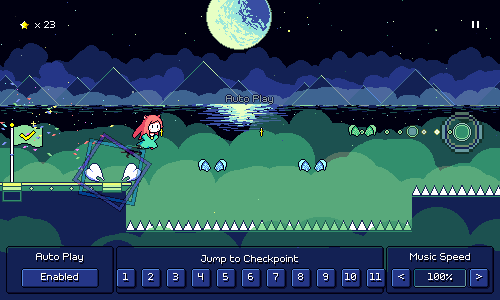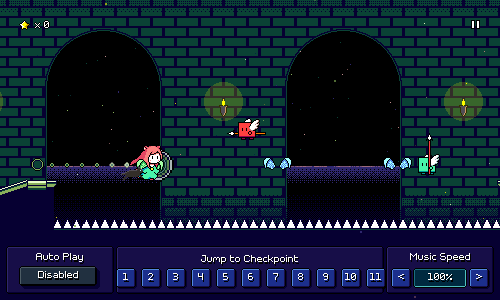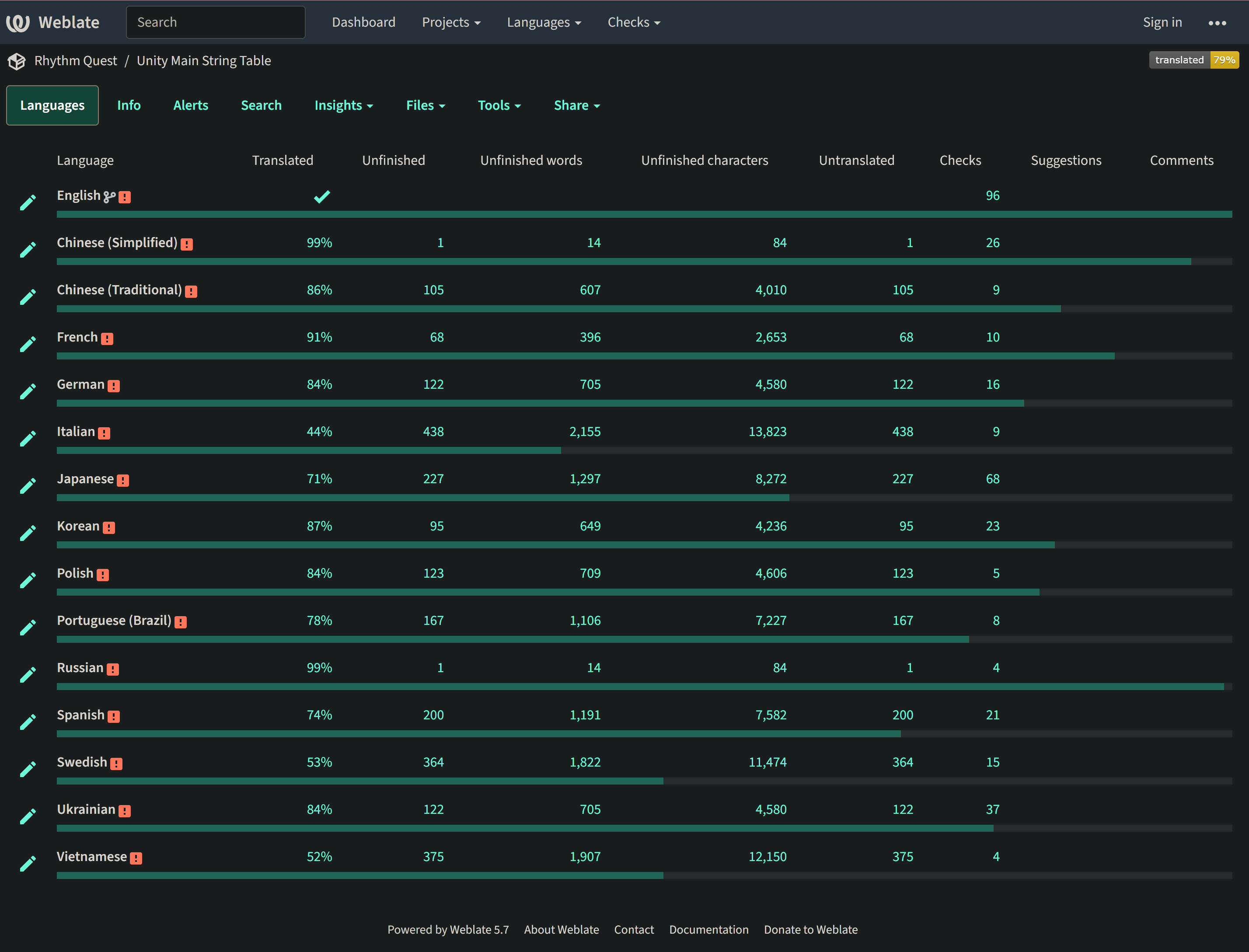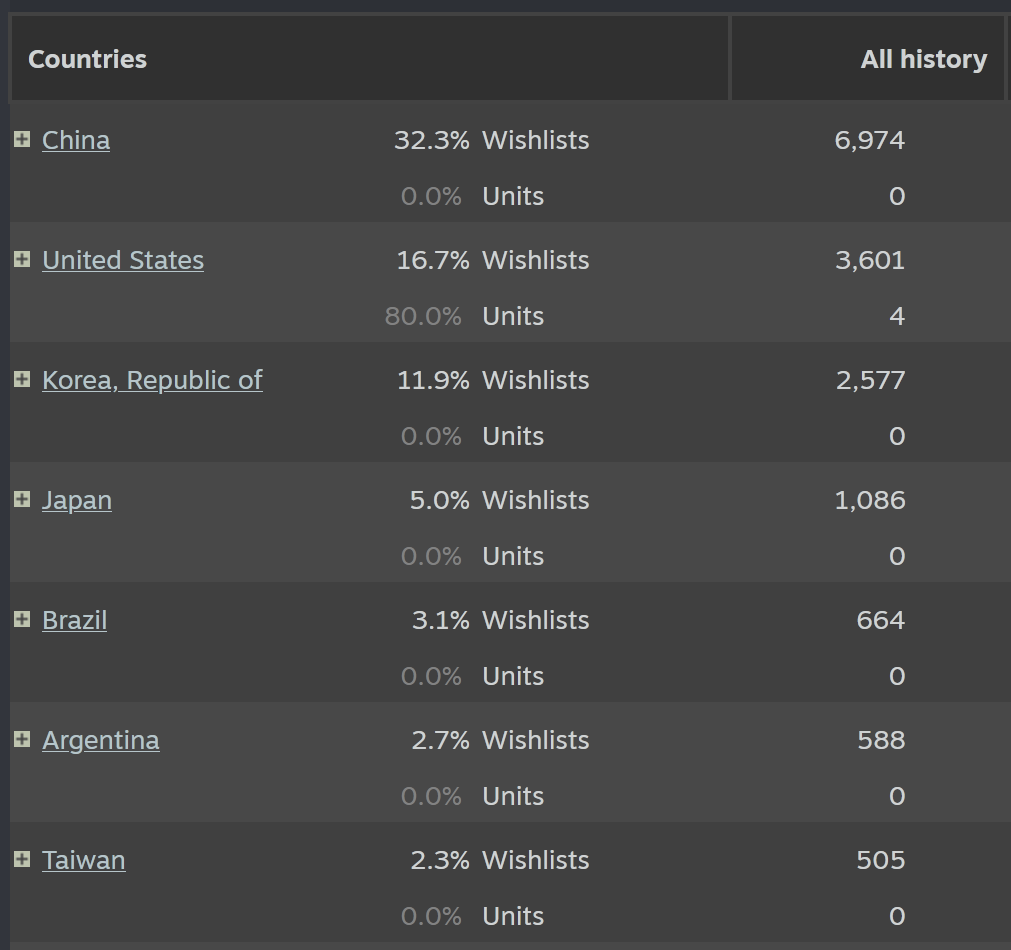Devlog 70 - Midnight Moon, Rondo Alla Turca
Published: August 29, 2024
Midnight Moon
Working on new levels has consistently been my favorite part of Rhythm Quest development! As I continue to flesh out my roster of bonus stages (I've got 15-20 at this point!), I've been thinking about other musical styles that I haven't yet represented. One of those is DnB (Drum and Bass), so I made a track called "Midnight Moon" inspired by "Liquid DnB" soundscapes:
This one is at a very brisk tempo of 170 BPM, but doesn't feature any of the mechanics from worlds 4-6 (water/speed zones, green enemies, yellow ghosts), so it's a good exercise in simply testing your ability to read basic patterns. I'm making more liberal use of syncopated rhythms in the bonus songs throughout, though, so they are going to be a little trickier to sightread than the main stages.
As I've probably mentioned in the past, even when I do use offbeat rhythms, I'm trying to keep them relatively readable, often favoring airjump patterns over basic enemies as they tend to be easier to read at a glance based on height differences.
For the music side of things, the basic structure of the DnB soundscape is actually not very complicated. The foundation consists, of course, of a nice drum loop, and then a prominent low bass synth with a little bit of "wetness" (growl/detune/warble) to it:
The cool thing about the liquid DnB-inspired soundscape for me is that the tight drums contrast with the other melodic layers going on, which are either drenched in lush reverb, or have softer textures. Here I'm using a droning bell-type pad loop sample, some electric piano-ish plucks, and then a chiptune arpeggio that's put through a ton of reverb:
Here's all of that coming together in the main drop of the song, which also adds in a few other new elements (an additional drum loop layer, a high blippy synth):
Rondo Alla Turca
I'll eventually try to get someone else like Bach in the mix, but for now we've got some more Mozart! This time the very well-known "Alla turca" movement of Piano Sonata No. 11 in A Major, also known as the "Turkish March":
This chart is simpler (doesn't even use ghost enemies) and should be a fun, light-hearted playthrough for anybody who has gotten to world 3-ish. Being familiar with the melodies of the song should also make sightreading a bit easier, which is nice. There's not much else to say about this one so let's just move onto talking about other stuff!
Pausing while Respawning
Finally!!! This seems like such a trivial thing but has literally been on my TODO list for years...you can pause in the middle of a respawn now:
It's...actually still not perfect, as instead of immediately resuming the respawn where it left off, it restarts the respawn transition so it might take a few extra beats. But that's certainly good enough for me!
You might be asking why this took so gosh-darned long for me to implement and the answer is that the respawn logic is actually really complicated with a bunch of different moving parts. Briefly speaking, during a respawn the following things happen:
- Switch over seamlessly to the respawn music loop (which was already playing, just at 0 volume)
- Find a seamless point in the future to reschedule the main music
- The pause music loop and respawn music loop also need to be scheduled (at 0 volume!)
- Take care of the actual camera and player animation, which needs to be smoothly interpolated
- At the end of the respawn, the entire audio timeline needs to be shifted
Because of how audio needs to be scheduled in advance (otherwise you run into audio buffer/latency issues), pausing that entire process isn't as simple as "just pause here and resume later" -- the scheduled music transition needs to be cancelled entirely. Of course, pausing the game also involves some special logic (keeping track of when in the music the player paused, so that we can later schedule the unpause seamlessly and drop you in on the right beat).
This was really daunting, so I kept putting it off, but recently I was working on handling an edge case where switching the audio device (e.g. plugging in a pair of headphones) would cause all currently-playing audio sources to stop (sigh...) and need to be rescheduled, so I went in and tried to just solve for all of this at the same time.
Weblate Setup
For a while now the community translation/localization efforts for Rhythm Quest have been managed via its page on Crowdin. This has mostly sufficed (actually was a headache at first as their Unity integration wasn't robust and I had to patch it up a lot...fortunately they have patched all of that up since then), but despite my impressions of the game not having a lot of text, I eventually started adding enough options and level editor UI flows that I quickly started running into the limits of their free plan (word count X number of languages can be 60,000 at most).
The next tier up would cost $150 USD a month (yeouch) and only increase that limit to 100k, so I chose to look for alternative solutions for hosting and managing community trnaslations (hopefully something better than just reverting to using a scrappy shared google sheet). I ended up looking into Weblate, an open-source solution for this. Weblate's cloud-hosted option costs ~$40 USD a month, but you can also host it yourself if you have enough know-how to administrate a web server and set up all the infrastructure for it.
After some failed (but educational) attempts at bringing that online earlier this year, I managed to actually get that mostly up and running on my web/cloud infrastructure stack:
This is not really production-ready yet (I've disabled new user registration and everything), and there are still some aspects of it that I need to follow up on, but it's good to know that this has a good shot of panning out for my localization needs moving forward. It's still not free, of course, as I need to pay for the server resources and all that, but the cost is an order of magnitude less than I would be paying otherwise, so it's a win there nonetheless.
Translation is actually quite an important thing for my game if you look at the Steam wishlist breakdown by region, as the majority of my wishlists are actually from non-English speaking countries...
I had some plans initially for transitioning to using a professional agency and/or service for localization, but got a little discouraged after thinking about the costs involved. I guess it's a hard thing to commit money toward something that hasn't really yet cost you anything nor made you anything either...
<< Back: Devlog 69 - Level 6-3
>> Next: Devlog 71 - Level 6-4, Even More Bonus Levels



